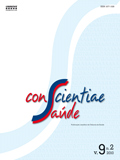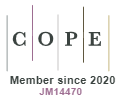Neuropsychomotor changes in premature infants treated in a long period of mechanical ventilation
DOI:
https://doi.org/10.5585/conssaude.v9i2.2214Keywords:
Mechanical ventilation, Neurological, Physiotherapy, Premature.Abstract
Introduction: Extremely premature infant usually requires neonatal intensive work such as invasive mechanical ventilation associated with endotracheal aspiration, method which can cause neurological deficits. Objective: It was done a literature review on the possible neurological consequences that arise with the treatment in neonatal intensive care unit in premature infants with very low weight. Method: Studies were analyzed in the period of 1994 to 2010, using the bases BIREME, SCIELO, Lilacs, Pubmed, Science Direct. Results: It was observed that the neurological disorders are mostly associated with metabolic abnormalities, such as oxygen deficit. The joint analysis of data reflected in the respiratory therapy can be either beneficial or harmful, and to minimize or eliminate the harm, it must be applied by a qualified specialist in the neonatal area, to choose techniques when it is necessary. It was verified an association between the use of mechanical ventilation and psychomotor deficits in infants at high risk for the motor development.Downloads
Downloads
Published
How to Cite
Issue
Section
License
Copyright (c) 2010 ConScientiae Saúde

This work is licensed under a Creative Commons Attribution-NonCommercial-ShareAlike 4.0 International License.
Autores que publicam nesta revista concordam com os seguintes termos:
O(s) autor(es) autoriza(m) a publicação do texto na revista;
O(s) autor(es) garantem que a contribuição é original e inédita e que não está em processo de avaliação em outra(s) revista(s);
A revista não se responsabiliza pelas opiniões, idéias e conceitos emitidos nos textos, por serem de inteira responsabilidade de seu(s) autor(es);
É reservado aos editores o direito de proceder a ajustes textuais e de adequação às normas da publicação;
Autores mantém os direitos autorais e concedem à revista o direito de primeira publicação, com o trabalho simultaneamente licenciado sob uma Licença Creative Commons Atribuição-NãoComercial-CompartilhaIgual 4.0 Internacional;
Autores têm permissão e são estimulados a publicar e distribuir seu trabalho online (ex.: em repositórios institucionais ou na sua página pessoal) já que isso pode gerar alterações produtivas, bem como aumentar o impacto e a citação do trabalho publicado;
Em virtude de aparecerem nesta revista de acesso público, os artigos são de uso gratuito, com atribuições próprias, em aplicações educacionais e não-comerciais.



